Patrick Carlyon: How Collingwood coach Nathan Buckley saved his job
LAST November Nathan Buckley had barely survived a club review after the Magpies had crashed for the fifth year running. Patrick Carlyon describes how the Collingwood coach grew a beard, loosened up and set the Magpies on a winning course.
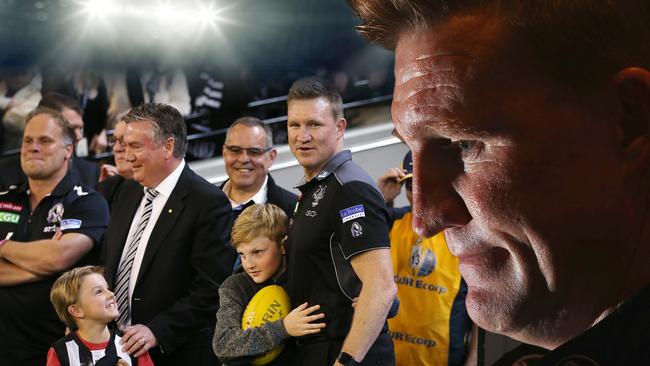
Collingwood
Don't miss out on the headlines from Collingwood. Followed categories will be added to My News.
COLLINGWOOD had crashed again, for the fifth year running, and coach Nathan Buckley had barely survived a club review.
That’s the official history. The unofficial version cast him in a harsher glare than any prime minister knifed by his own. Buckley was offered more free advice than Nick Kyrgios. His children were taunted after losing games as they ran the gauntlet of fans from the stands to the rooms.
Yet here was Buckley at pre-season training last November, fronting up for another year of unwanted character assessments. And here, as it now seems, was a telltale sign of a season that would play better than the critics hoped.
BUCKLEY: COLLINGWOOD READY FOR PERTH FINALS PRESSURE
BUCKLEY OR SIMPSON: WHO IS AFL COACH OF THE YEAR?
PENDLEBURY: WE CAN BEAT ANYONE, ANYWHERE
According to young Magpie player Tom Phillips, the coach was “more relaxed” than previous years. Not “full on and overbearing” in the manner of his playing days — or any of those hapless prime ministers.
The hints of something fresh would keep coming. Mid-season, another player, Jack Crisp, spoke of the club being “100 per cent” more relaxed. He said “everyone seemed to be enjoying themselves”, despite the club’s dreadful run with injuries. And despite a coach whose entire footballing career — until then — had been built on brooding perfectionism.
By then, of course, there was another more obvious tell.
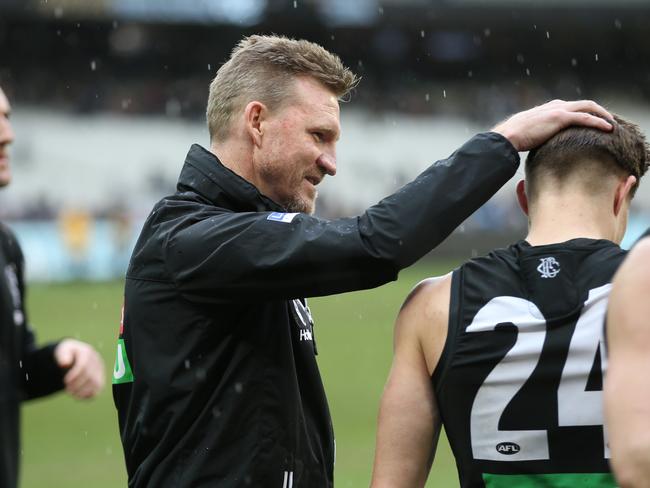
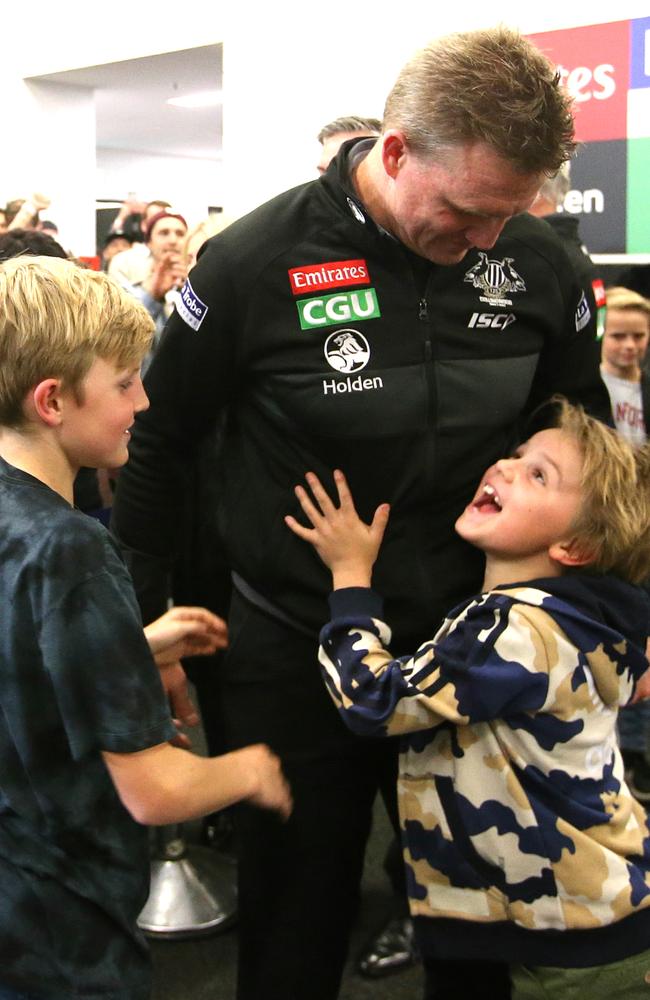
The coach was sporting a beard. “Scruffy,” someone said. A “surprise brown-grey facial growth,” according to a media story, which could have doubled as a dermatology report.
Buckley smirked in speaking of the beard’s genesis, a bet between coaches and defenders over opposition goals from stoppages. It told of a fun ethos that had been absent last year, where players smiled, and joked, and liked to go to work.
Buckley’s beard has disappeared briefly this season, then returned due to popular demand.
Its existence has come to mean more to Collingwood insiders than a passing football colour story. Former coach Tony Shaw hails it as the sign of a “laid-back atmosphere” and a “happy group”. Club president Eddie McGuire says the beard is bringing Collingwood luck.
Should Collingwood go deep into the finals, the beard may assume a significance akin to “Pagan’s Paddock” at North Melbourne or “Mrs Hardwick” at Richmond. An ad hoc emblem for success and solidity. It tells of a club that has loosened up after trying too hard for too long, and of a coach who has learned to be comfortable with himself.
Buckley has delegated more this year, and chaired less meetings. He has appeared lighter in public, wry and self-deprecating, conceding he does not fixate on problems as he once did. The grace he showed under siege is no longer required — instead, he is encouraged by footballing peers about his long-overdue smile.

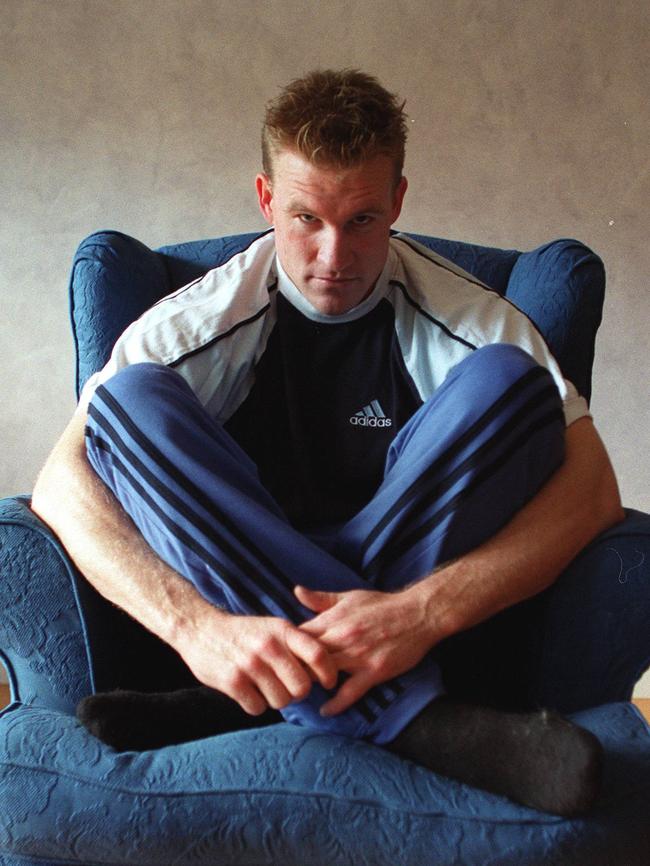
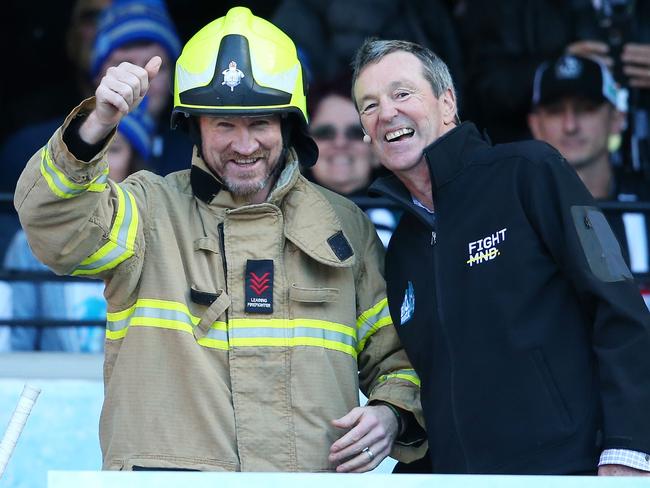
The issues of his first years as Collingwood coach suddenly seem long ago, when the succession from Mick Malthouse got muddled in disputed versions of the narrative. Senior players resisted Buckley’s attempts to mould his team. It’s still suggested Buckley was undermined by players who were not committed, that he tried to lead a team that was not his.
Buckley, himself, struggled with the message. He had a clear picture of what he wanted, but he did not always lead players and assistant coaches in the same direction. They felt he didn’t listen.
A prevailing view is that Buckley is communicating better. That he feels supported and has learned to trust, an aspect he has consciously worked on for years. One insider says the single attribute that distinguishes this season from Buckley’s previous years is his willingness to listen.
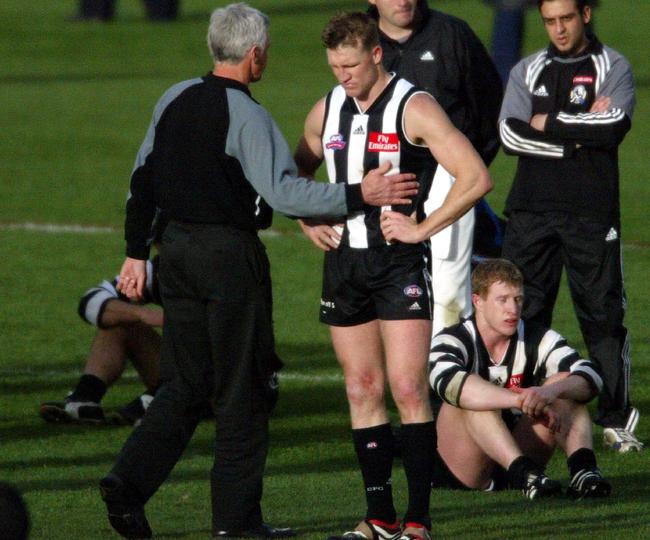
There remains a residual sense that whatever his failings as a novice coach, players let Buckley down in his first years. In contrast, his players are now playing some of their best football, including younger players, the unknown types who shaped last year’s flag for Richmond.
The poor skills and poor execution that marked recent Collingwood seasons has been replaced. “They’re doing it for the right reasons,” Shaw says. ‘They’re having fun.”

There are comparisons with Richmond, which emerged from the ladder depths last year to squeeze, pressure and ultimately stroll away with a flag. Take this from Richmond defender Nick Vlastuin, which could be swapped with any Magpies player this year: “It’s fun, mate, they’ve stripped it back a little bit this year, let us take control a little bit.”
Or compare the club review at Collingwood with Richmond’s a year earlier. Many thought Buckley would go, as they had of Hardwick at the Tigers. Corporate reviews are never pleasant. They’re rarely as successful as Richmond’s was credited as being. Often, they are dismissed as expensive shots in the dark that spill a lot of blood.
At the time, pundits decried Buckley’s credentials. The club privately lamented the nastiness of vitriol it likened to sanctioned lynching. Experts queried Buckley’s coaching nous, as one legendary AFL coach privately questioned Hardwick’s strategic wherewithal to this journalist before Hardwick’s premiership year.
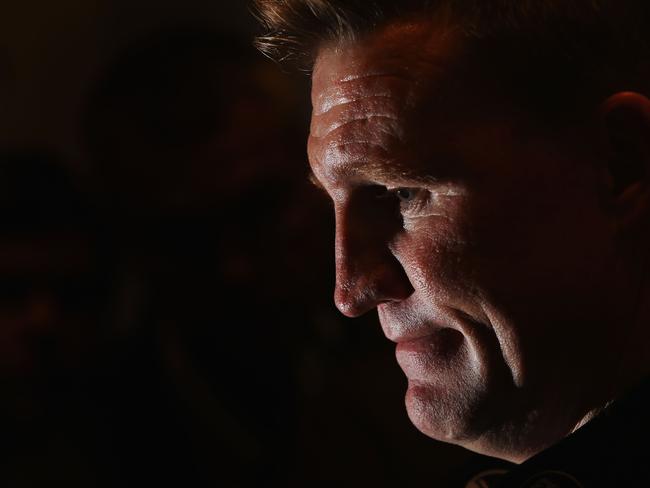
Buckley, as did Hardwick, has submitted to change. Almost 40 roles within Collingwood were adjusted. Garry Hocking would be an assistant coach, Nick Maxwell was given a leadership role. Football manager Geoff Walsh, who has almost as much finals campaign experience as anyone, has been critical.
McGuire describes last year as a “furnace”. He baulks at comparisons with the Tigers, paraphrasing the late tycoon Richard Pratt — sometimes, in seeking the change, the answer is to do nothing.
Last year, there was “no joy”. “When you’re doing an open and accountable full review of every single position in the place, people are nervous and the tension is there,” he says. “It went right throughout the year and it was really, really hard on everybody. Nathan copped the brunt of it and yet again, he was prepared to face up to everything and do the right thing by the club.”
EDDIE MCGUIRE OPENS UP ON HIS BIGGEST MAGPIE MOMENTS

This year started with ”an equanimity” borne of a plan, he says. Processes were in place, and the club believed in them. A big shift, McGuire says, was a recognition that Collingwood could not control what was happening outside of Collingwood.
“You need to be able to step back and look to people who are trusted, and if everyone believes everyone is doing the right thing for the right reasons, you can get to the correct place pretty quickly and build upon that,” he says.
To have sacked Buckley, McGuire says, would have been the “easy” choice. To keep him goes to the growing belief that coaches need to grow into the role, learning from errors on the job.
Collingwood historian Michael Roberts vouches for the decision.

“You’ve got to admire footy clubs in that context who don’t blink,” he says. “Who don’t just dump the coach at the first opportunity because it’s the easy thing to do and appease the masses. It wouldn’t surprise me if this becomes the new normal now. There’s now two or three instances of where people can point to the benefit of sticking fat and giving coaches a bit more time to right the ship.”
Buckley’s development — as both a person and a leader — has been long analysed. His drive has often been confused with arrogance, stemming from his on-field handling of teammates during his earlier playing days.
His motivators trace to his childhood. In the book, Champions: Conversations With Great Players & Coaches of Australian football, Buckley says that football offered him self-worth as a kid. He was upset when he missed selection in the Northern Territory primary schools side — and was lambasted for whingeing about his omission.

He put pressure on himself, and his self-imposed fitness programs — and associated journals — sound close to obsessive. He avoided shortcuts and feared failure. He figured everyone should work as hard as he did. On realising others had different approaches, he got to know teammates as people (he still talks about the need to recognise that people are entitled to live as they like): “Leadership is about making things easier for people by showing them the right way, but I know at times I’ve made it harder for teammates to make the right decisions.”
Shaw coached Buckley and saw his maturing. “As a player, you play because you are a good player,” Shaw says. “If you go the next level, you become a captain and you learn that everything is about everyone else, and that you’ve got to give of yourself. It took him a while but he did it and became a great captain. That’s now happening with his coaching.”
Whether Buckley’s smile has brought success this season, or success brought Buckley’s smile, stands to be a chicken-and-egg type debate. But the question of Buckley’s evolution seems clearer. Should Collingwood go far in September, Buckley may have “surprise grey-brown facial growth” for some time yet.


